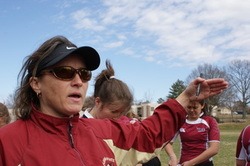A True Pioneer: Nancy Campbell and the Rugby Sorority
- WRCRA Main

- May 26, 2020
- 3 min read
Nancy Campbell admits to having a convoluted playing career. She started playing in college at Florida State, and in her first season the team went to the national championships. She recalls the FSU team at that time “as a lot of fun and dead serious.” Nancy played for a year before the demands of work and school required her to take a step back from rugby.
After graduation Nancy moved to Canton, Ohio and was able to play socially with the Canton men's team. She soon found herself making the ninety minute commute to play with a new women’s team in Cleveland. That was 1998 and her true rugby journey was just beginning. Nancy soon moved to Raleigh, North Carolina and began playing with Eno River and the South All-Star team. She then moved to Memphis and started the Memphis women’s team. From there it was on to Chattanooga, where she started a Chattanooga 7’s team and played for both Nashville and Knoxville. She soon packed up her mouth guard and cleats and moved again to Shreveport, Louisiana, where she started a 7’s club, the Shreveport Valentines. Meanwhile she commuted to Dallas to play for the Harlequins. Finally, Nancy moved back to Nashville where she began to wind down her playing career. She still plays in 7’s tournaments and plays 15s socially.

Beyond playing, Nancy tried her hand at refereeing but admits that she was a terrible referee, with the humble acknowledgement that refereeing is hard which makes her want to never criticize a ref. However, she keeps her certification up to date so she can stay current on the laws. Nancy is also a level 300 coach, starting her coaching career out of necessity at Shreveport and has coached on and off since that time, defining herself as a really great assistant coach.
But Nancy’s real strength has been in club administration where she’s always held an officer position, from manager to tech to match commissioner. Nancy was the DII coordinator for the women’s South and worked to make women’s DII recognized at the national level. She also worked closely with Danita Knox who, at the time, was running the South and created the DII national championship from the ground up. Nancy also was the match commissioner with USAR once that position was created. All this work has some reward; Nancy was recently inducted into the Memphis Rugby Hall of Fame. She is the first woman to be inducted and says she was moved by the women from all generations who came out to celebrate and support her.
Nancy was drawn to the USWRF and WRCRA to counter what she calls “the magical disappearing women’s rugby players” - women who play in college and then disappear. She strongly believes that we need to keep women involved and build their skill sets so that we can keep growing the sport and keep people engaged at all levels. Nancy says that while she valued the early work of the USWRF to provide grants for girls and women’s teams, WRCRA and its Annual Conference have taken USWRF to a whole new level of strategic planning, thinking, and idea generation. Through her involvement, Nancy hopes to get younger coaches, referees, and players involved by increasing access points into the organization. One way she has modeled this is by joining the Pioneers Club through regularly monthly giving rather than a single $1000 donation. She approaches her giving to FSU the same way, earmarking monthly donations to women’s rugby. Nancy believes in the importance of making regular monthly donations, as it’s affordable and builds a culture of giving, with small things regularly adding up to big change. However, this isn’t one of those “now is my time to give back stories.” This is a profile of the strength of the women’s rugby community and the sisterhood that exists within it, especially for those who are willing to be in the trenches, doing the coaching, playing, refereeing and administrative work to keep women’s rugby growing and thriving all over the U.S. This comes naturally to Nancy and she has similar experiences in her sorority, Kappa Kappa Gamma, which she joined because there were other rugby players who were members. Nancy says that sororities are a lot like rugby teams - they struggle with retention as women make the transition from college to alumni chapters. So, how do we let people know that the evolution of the sisterhood is possible? Nancy hopes to do that by focusing on maintaining strong relational bonds, which can happen at all levels of rugby supported by organizations like USWRF and WRCRA.








Comments